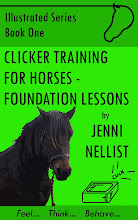Aggression is a symtom of fear. Just think about what it takes for you to behave aggressively, such as to feel road rage or snap at a loved one. Aggression involves a lot of emotional energy, normally accompanied by a 'bad hair day'. Behaving aggressively on a regular basis is hard work and emotionally draining. The same is true for our horses and other animals, yet often we counter aggression with more aggression - the horse threatens to bite or kick, and we yell at or hit it! This is fairly natural. We got scared by the horse, and behaved aggressively back. It's true, aggression really is a symptom of fear!
But while I think we can all be forgiven for retaliating in the heat of the moment, we must be careful not to get locked into a downwards spiral of aggressive behaviour. Just think about what you learned last time you were frightened by a horse, and at very least, were tempted to retaliate with further aggression. It's possible that you were scared, and now you are aware of the potential for dangerous, aggressive behaviour from your horse in future. You might have found that this affected your behaviour towards your horse in similar circumstances - maybe you tied your horse up shorter, or were ready to deliver a reprimand in order to prevent being bitten, something we're often taught to do. You are simply more aware of the potential danger, and prepared to defend yourself.
Now think about it from the horse's perspective. The horse bit or kicked because he was scared. Scared of what might be unclear, but it is most probable that he was scared. He then recieved what he considered to be aggresive behaviour in return. This taught him he was right to be afraid, and this has an impact on his future behaviour. If a horse anticipates he may be frightened, then he is already priming himself to use defensive behaviour, including aggression. If he does behave aggressively again, and get the same result, retaliation from a scared human, then future aggression from both parties becomes more likely, unless there is intervention.
It's important to realise just what it is that is setting the horse up for aggression. One way to set horses up for aggression is to put them in situations where there is competition between horses for vital resources such as food, water, dry places to stand, shelter from the elements, and so on. This is one way to ensure a horse experiences mutiple 'bad hair days'. When such resources are in short supply, horses feel more agitated. And when they have repeated aggressive encounters with their herd mates, they feel worse. Feeling uncomfortable like this makes small niggles, such as accidentally jerking the grith when tightening it, into major discomforts that may trigger aggression. Horses may also become more aggressive towards people around their feed bowls, fearing that their people have now taken a liking to horse food and wish to take it from them. Fear of loss is as bad as fear of pain; both are highly averisve to horses.
It is fear of loss that may teach a horse to bite over food. It's a bit of a no-brainer, but hungry horses find being fed a highly pleasurable, and indeed, exciting event. But it's also an unpredictable situation from the horses's perspective. Humans can walk off without notice, taking the food with them, they often do when carrying food past a horse, whether the food is in a bucket or in a pocket. Horses can see this as totally devastating, and they are provoked to solve the 'moving food puzzle'. Horses have little natural preparation for moving food; only when they are a foal does their food actually have legs! Foals resolve the moving food problem by cutting in front of mum, forcing her to 'stand and deliver'. When people walk off with food, horses repeat the same action they used on mum. They catch up, over take, and park themselves in front of us. And if they are very tense, they can take this one step further. When faced with sudden and unexpected removal of something valued so highly, they are triggered to intense fear and frustration, and more extreme aggression is the result.
So what's the solution? Well, it does depend on the horse and the exact situation. But, aggressive horses need to be managed so that they have a happier lifestyle. This way they'll have fewer bad hair days and be less sensitive to aversive situations. But it is also important to remove the source of fear, by identifying it, and then taking action to either avoid it or desensitise and counter condition the horse to it. The aim of desensitisation is to help the horse learn that the perceived threat is nothing to be feared. Counter conditioning teaches the horse to actually enjoy the previously frightening event. In the meantime, it is our responsibility to handle an aggressive horse as calmly as we can possibly muster.
Subscribe to:
Post Comments (Atom)

No comments:
Post a Comment